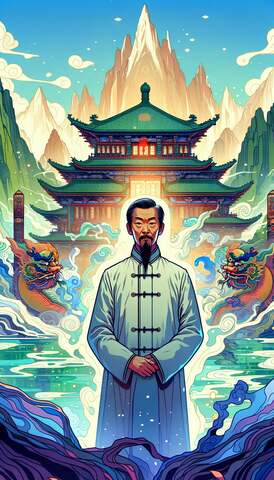
春秋时代,有个晋国的公子叫做孙周。
他是晋襄公的曾孙子,也是孙谈的儿子。
因为当时在位的晋厉公不喜欢他,所以他就去了周王室,为单襄公工作。
孙周是一个很诚实的人,他做事总是非常重视道义。
虽然他离开了自己的国家,但他还是常常关心着晋国的一切。
如果听到晋国有什么不好的事情发生,他会感到很难过;而如果听说晋国有喜庆的事情,他也会很开心。
有一天,单襄公病得很重,他把儿子单顷公叫到身边,对他说:“你一定要好好照顾孙周,因为他将来会成为晋国的国君。”
他还告诉单顷公,孙周是个有文德的人,这种人会受到天地的保护和祝福,一定会成为一个伟大的领袖。
单襄公说,孙周站立的时候站得直直的,这就是正直;看东西的时候不会东张西望,这就是专注;听别人说话的时候不会竖起耳朵,这就是稳重;讲话的时候不会说得太远,这就是谨慎。
这些都是美德的表现,是做人的基础。
单襄公还说,孙周总是为晋国感到开心或难过,这说明他没有忘记自己的根。
这样一个人既有美德又有善行,怎么会不成为一国之君呢?
单顷公答应了父亲的要求,后来,晋厉公在一场内乱中被杀死了,晋国人就把孙周接回来,并立他为国君,也就是晋悼公。
从那以后,人们就把“晋休戚,不背本也为”这句话,变成了“休戚与共”这个成语,用来形容两个人关系非常好,无论遇到好事还是坏事,都会一起分享、一起面对。
In the Spring and Autumn Period, there was a prince from the Jin state named Sun Zhou.
He was the great-grandson of King Xiang of Jin and the son of Sun Tan.
As King Li of Jin disliked him, he went to the royal family of Zhou and worked for Duke Xiang of Shen.
Sun Zhou was an honest person who always valued righteousness in his work.
Although he left his own country, he still cared about everything in Jin.
If he heard anything bad happening in Jin, he would feel sad; if he heard any happy news, he would be glad.
One day, Duke Xiang of Shen fell seriously ill. He called his son, Duke Qian of Shen, to his side and said, "You must take good care of Sun Zhou because he will become the ruler of Jin in the future."
He also told Duke Qian that Sun Zhou was a man of virtue and such people were protected and blessed by heaven and earth. They would surely become great leaders.
Duke Xiang said that when Sun Zhou stood, he stood straight, which showed his uprightness; when he looked at things, he did not look around, which showed his concentration; when he listened to others, he did not prick up his ears, which showed his calmness; and when he spoke, he did not talk too much, which showed his caution.
All these were manifestations of virtues, the foundation of being a human.
Duke Xiang also said that Sun Zhou always felt happy or sad for Jin, which showed that he had not forgotten his roots.
How could such a man, with both virtues and good deeds, not become a ruler of a country?
Duke Qian agreed to his father's request. Later, King Li of Jin was killed in a rebellion, and the people of Jin brought Sun Zhou back and made him their ruler, known as King Zhao of Jin.
From then on, people turned the phrase 'Jin shares happiness and sorrow and never forgets its roots' into the idiom 'sharing happiness and sorrow', which describes two people who have a very close relationship and share and face good and bad things together.